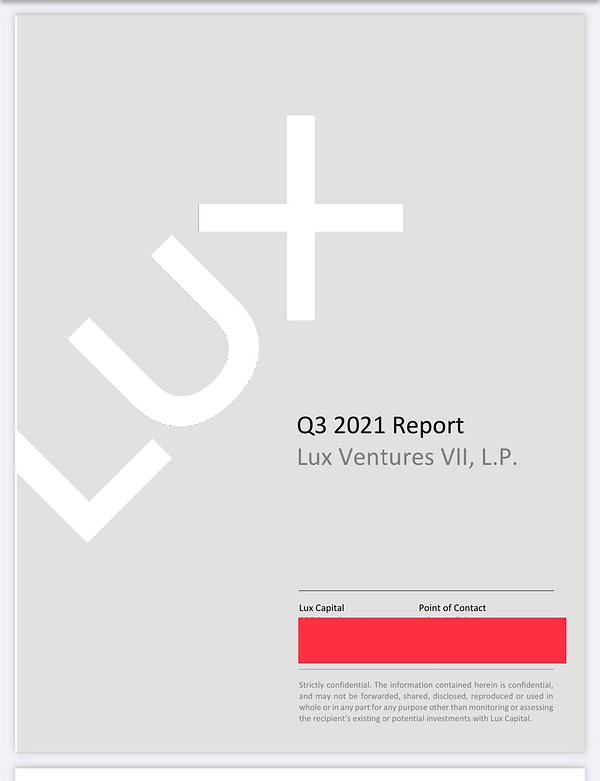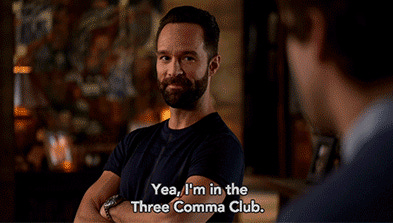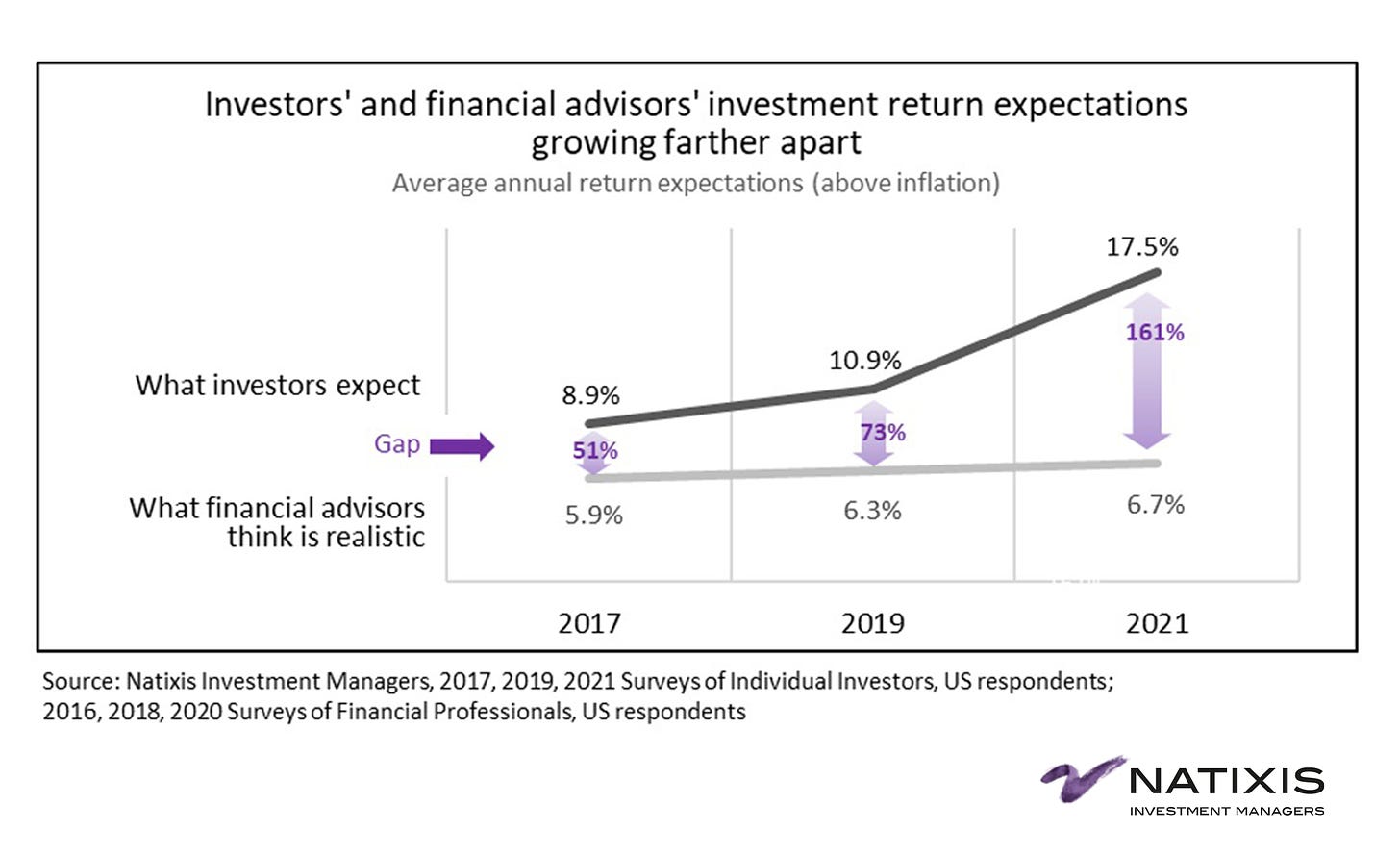Workshop Note: Wen Rich, Ser?
"People don't have the patience to get rich slowly, so they go broke quickly." - Dividend Growth Investor @DividendGrowth
Hi all.
This probably means nothing but this past Saturday I entered a new barbershop and was immediately immersed in a passionate conversation about crypto. One of the customers, getting a fashionable side buzz, was a professional investor and listened to the barber discuss the pros and cons of various coins. Apparently, “baby doge” was going to be “the next Shiba Inu.” (Disclaimer: this is definitely not investment advice! For an explainer of crypto vernacular - check out this thread)
It should come as no surprise that cryptocurrencies sold off this week😉
What fascinated me was that the barber could quote the coin in the number of its zeroes. Baby Doge was an “eight zero coin.” Shiba Inu was a “four zero coin.” Imagine the upside! His plan was to bet a few thousand dollars for a potentially life-changing payoff some time next year.
I would have never imagined that Silicon Valley’s “three comma club” would make way for the “more zeros more upside” club. But here we are.
One of the defining characteristics of Nick Sleep and Zak Zakaria was their patience. They created the right conditions and expectations to be able to patiently wait for their big idea to play out.
We don’t all have that luxury. As @ShortsightedCap observed:
“We all want to be Nick Sleep (2013 vintage…). Or we are supposed to. Find the next Amazon and let it run. It’s a super elegant, tax efficient way to make money. I am definitely not Nick Sleep. For starters, AMZN can suck for a year. Maybe even 2! And I probably get executed after 1 bad year. Almost definitely after 2.”
It’s and age-old duration mismatch of reality, incentives, and emotions. We don’t want to be patient, not after seeing our peers get rich at lightning speed. Sometimes we can’t afford to be patient. Our investors demand results soon or they will redeem. The landlord wants to get paid next week, not a year from now.
Our time horizon changes with the market environment: “at the top, everyone’s time horizon extends to infinity.”

This is true in terms of the time horizon for growth or cash flows. In a bear market or recession, cash and near-term cash flows are king. Today, a pre-revenue company like Rivian can IPO at $66 billion and promptly double in price.
But the opposite may also be true. At the top, our time horizon for results collapses towards the now. The market is extending plenty of time for Rivian to build and sell cars. But investors want gains from Rivian stock today.
This year, I was not patient. I started a new and risky journey, writing. And after being very risk averse last year (when I was depressed and anxious after being laid off), I was now desperate to catch up. I was looking for a solution for the anxiety and uncertainty inherent in my new path. I was primed for risky ideas with a potentially large payoff. Unfortunately, I didn’t look for those ideas in crypto or I would be writing a very different note. Instead, I made some mistakes and accumulated painful scar tissue. Thankfully, I didn’t go broke. But I did figure out new ways to lose money quickly and exacerbated the problem, rather than solving it. I’m going to file this experience among the “money paradoxes,” of which there seem to be quite a few.
If Sleep and Zakaria were defined by patience, crypto is defined by urgency. It feels like keeping up even with a subsector, DAOs, DeFi, NFTs, is a full-time job. One week we’re smashing toilets, the next we’re trying to buy a copy of the U.S. constitution. The ability to raise $40 million over the course of a week through a remote network of people, shared mission, and memes is really interesting.
I don’t have a strong view on individual projects yet but I think the concepts of DAOs and NFTs are here to stay. I used to think there was a lack of real world applications for the blockchain and that it was all a big ball of speculation. But I’ve changed my mind. Having internet-native money, property rights, social clubs and corporate-collectives seems like a real use case. Especially if one thinks about the metaverse as a broader concept, as “the moment in time where our digital life is worth more to us than our physical life.” That’s not an opinion on the value of any individual project or token, of course.
By the way, people in crypto aren’t the only ones whose expectations are high:
Corry Wang compared this to a 1999 survey by Bernstein. Back then, investors expected a casual 19 per cent. The actual 10-year forward return? A negative 2.3%.
Disclaimer. This is not investment advice. I write for entertainment purposes only. Always do your own research and ask your financial advisors. Don’t trust anyone on the internet.
It’s happening!
I had a chance to do my first podcast interview with founding member Jim O’Shaughnessy. It was a lot of fun and I’m excited to share it with you. Unfortunately, it won’t be released until January due to a backlog of episodes. Jim is another great example of a media first investor who established authority with his books before launching into asset management. I can’t believe I missed his example when I wrote the piece! Speaking of which, Lauren Capelin surfaced even more examples.
I also recorded another conversation, this time with author Sebastian Mallaby, which I plan on releasing it shortly.
As an addendum to my piece on clutter and clean slates, read Morgan Housel about expertise and the need to keep an open mind.
“Gaining experience takes time, effort, and often comes at the price of making painful mistakes. You don’t want to let those lessons go. You want them to mean something, to help you from making the same painful mistakes again. To help others from making the same mistakes you made. So it will always be the case that those with the most experience – and the good, smart, accurate wisdom that comes from it – will be the least willing to adapt their views as the world evolves.”
“Vishal Khandelwal recently wrote that old guys don’t understand tech, but young guys don’t understand risk. Another way to put it is: everyone has something to teach.”
“The moment one gets into the ‘expert’ state of mind a great number of things become impossible.” Henry Ford
An excess of excesses.
A must-read quarterly letter by Josh Wolfe of Lux.
“Valuations have risen, diligence has fallen, and excess is in excess.”
"Telepresence helps us connect with far-flung founders but true presence (in person) helps our team connect like never before."
"Dry powder is most valuable when liquidity, currently a flood turns a drought. Preparing for this turn is wiser than predicting when it may."
"In the last 12 weeks, startups raised more cash than during the entire 1999-2000 dotcom boom and bust."


New playbook.
Speaking of venture capital and urgency, make sure you check out Mario Gabriele’s breakdown of the Tiger Global playbook. This is wild: “Tiger is Bain's largest customer. The fund reportedly spends hundreds of millions on Bain's services every year, with much of that dedicated to company evaluation.”
“Tiger’s current private market thesis is simple: we are still in the opening stages of the digital revolution.”
“One of the most intriguing parts of Tiger's strategy is that it is exceedingly hard for traditional venture funds to emulate. By increasing the speed of the game, Tiger effectively sacrifices precision. It accepts a higher error rate to deploy more capital, faster. Copying Tiger breaks a traditional venture fund. If they choose to move quicker, they increase their error rate; if they want to outbid competitors, they reduce their return profile. Tiger is built to absorb these hits — the mandate explicitly dictates this approach, and the size of AUM makes it viable. But a traditional venture fund has a different, finely balanced risk and reward profile, not to mention a culture that tends towards the ponderous.”
No predictions.
Josh Wolfe already made the point that we can’t predict what the market will do, but we can prepare for different scenarios. Now check out Cedric Chin’s What I Learnt From Complexity, a post exploring the book Complexity by Mitchell Waldrop which chronicles the Santa Fe Institute and the research into complex adaptive systems.
“A complex adaptive system is a system in which a large network of components with no central control exhibit complex behaviour, sophisticated information processing, and adaptive learning.”
Like the stock market. Or traffic.
Here is one worldview implied by a complex adaptive system: you cannot predict what will happen in the future. History is like traffic: even tiny events might snowball into world wars. This is perhaps blandly obvious to you, as it might be to anyone who has read their fair share of history.
But here’s the kicker to that worldview: “… and therefore you must learn to act without prediction.”
This of course is the opposite of what we want to do. We want to predict, solve the puzzle, and be proven right.
What I enjoyed most about his piece was the specific example he gave of two geopolitical thinkers, Eastern and Western. Peter Zeihan who creates a narrative and makes a prediction. And Singaporean diplomat Bilahari Kausikan, who was taught by Lee Kuan Yew. I highly recommend you read and contrast the two styles and consider how this may play out in your own analysis.
“Zeihan’s narrative is mechanistic and precise, with clear cause and effects. Kausikan, on the other hand, like Lee Kuan Yew before him, does no more than to describe the tendencies of the state actors as he knows them, and the dynamics of the global political chessboard as he’s experienced it. To overuse our traffic example, Zeihan is giving you a precise commute time prediction; Kausikan is simply describing the nature of traffic in the road system.”
Podcast.
If you enjoyed Richer, Wiser, Happier I highly recommend this interview with author William Green. It’s a raw and honest conversation about why Green wrote the book. After losing his prestigious job in journalism, he wrestled with anxiety, fear of failure, and the question of how to navigate and endure uncertainty. The quest for answers in the book was for the readers as much as for himself.
“What if this is my one shot at writing a book that's really valuable? Let me try to do one thing that's really worthwhile and share ideas that are profoundly helpful.”
Profile.
This was a beautiful and very detailed profile of the life of a self-made, self-taught angel investor named Cyan Banister. Kevin is an exceptional deep-dive researcher and Dan a prolific writer. They’re an inspiring team bringing stories to life and I encourage you to check out their work.
DS: Why did you feel comfortable challenging Thiel when no one else did?
Banister: [laughs] He couldn’t do anything to me! What was he gonna do? Fire me? I don’t care.


If you enjoy my work, please consider sharing it with friends who might be interested. It would mean a lot to me and help me turn this into a sustainable effort. 🙏





